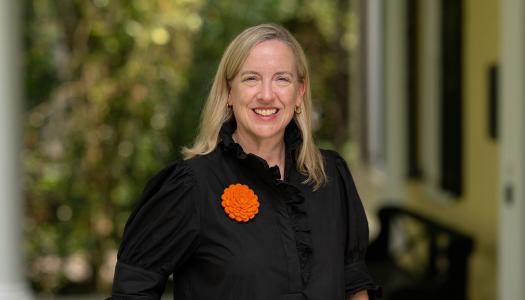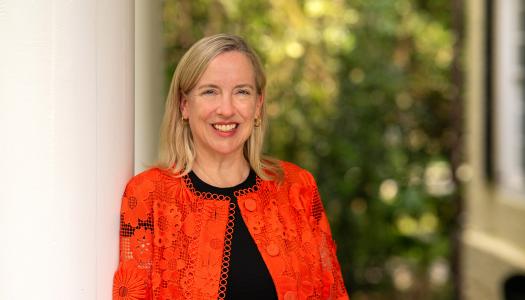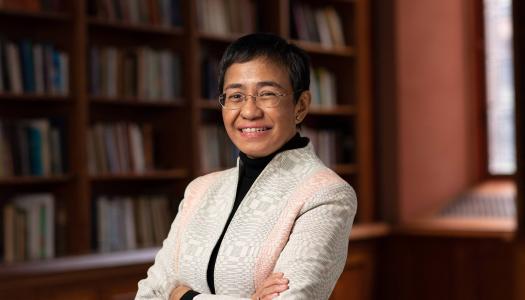Joe Schein ’37, oldest Princeton alumnus, dies at 109
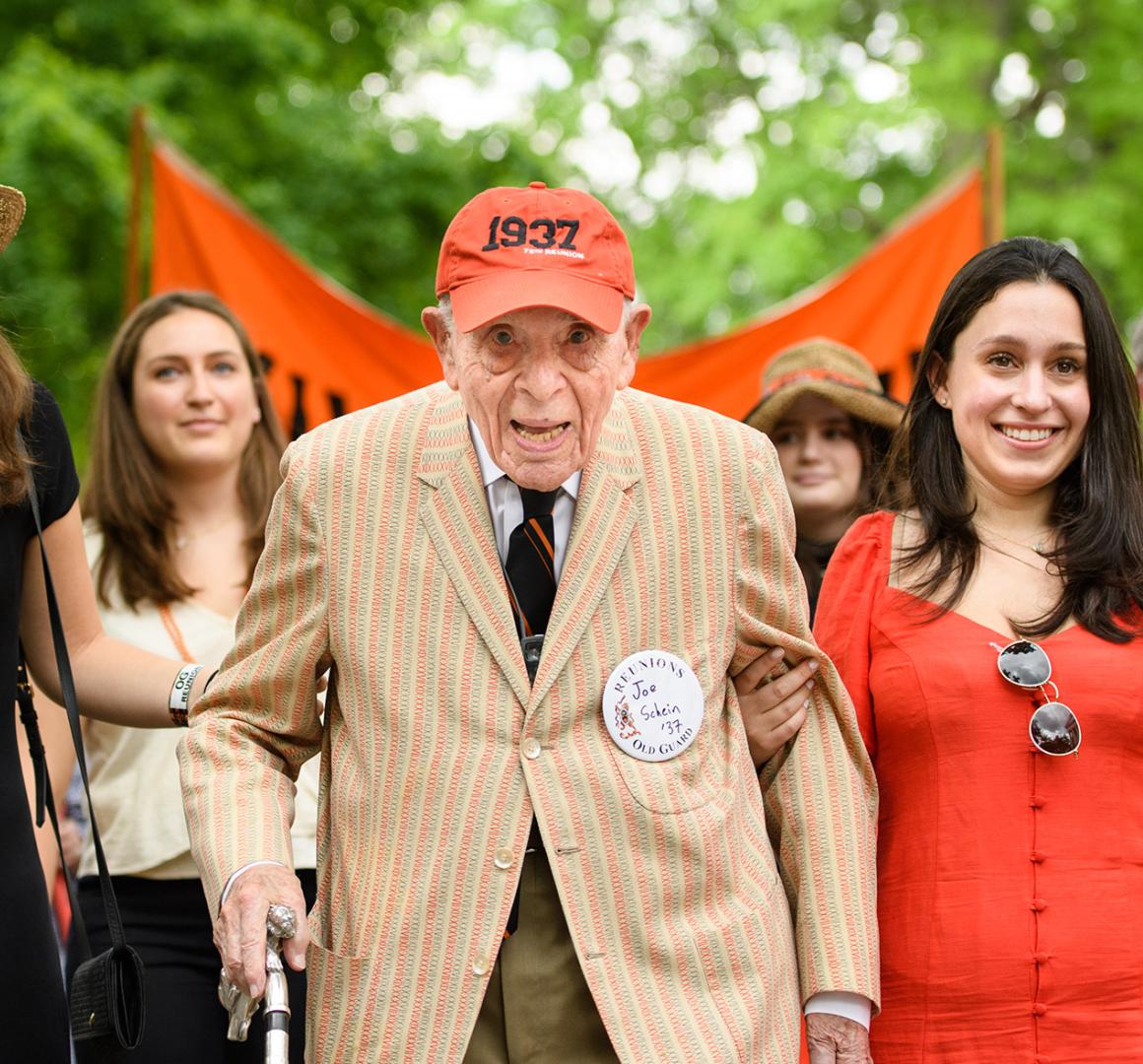
Joe Schein leads the 2018 P-rade at Reunions. Photo by Sameer Khan
Joe Schein ’37, the centenarian whose February birthdays and annual pilgrimage to campus for the P-rade were celebrated events for the entire Princeton community, died on May 24 in New York City at the age of 109. Born when Woodrow Wilson was president of the United States, Schein was the longest-living undergraduate alumnus in the history of Princeton, and his love for the University and its community only increased with time. “I would live here now — if they would let me,” he told the Princeton Alumni Weekly when he was 98.
Schein was an eight-time recipient of the Class of 1923 Cane, presented during Reunions to the oldest returning undergraduate alumnus, and he led the Old Guard during the P-rade beginning in 2016 when, at the age of 101, he walked the entire route in 90-degree heat. He was not able to attend Reunions this year, but he recorded a video greeting just weeks ago: “I wish you a very happy Reunions and I wish you all the good fortune that life can bring if you are prepared for it — and you certainly have been in Princeton. Go Tigers.”
“I was deeply saddened to learn of Joe Schein’s passing during Reunions,” said Princeton President Christopher L. Eisgruber ’83. “Joe loved this University and what it stands for with all his heart. He lived a full and rich life that epitomized Princeton’s ideals of excellence, the pursuit of knowledge, and a commitment to serving others. The entire Princeton community mourns his loss, and our thoughts are with the Schein family.”
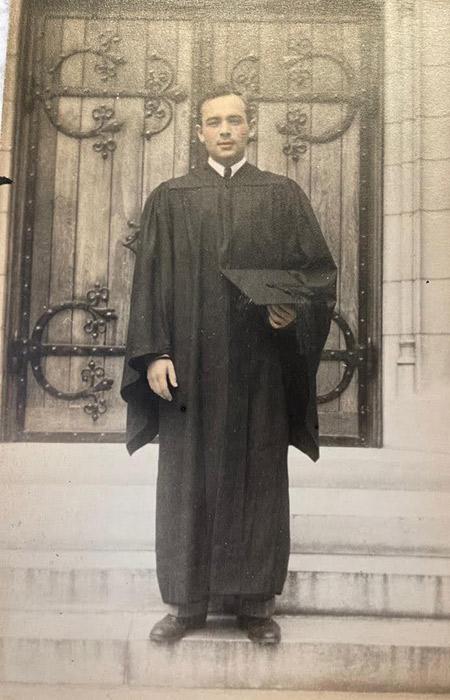
The son of Russian immigrants, Schein attended Barringer High School in Newark, New Jersey, where he was an accomplished member of the debate team and the captain of the fencing team. He was one of only 11 Jewish students admitted to Princeton’s Class of 1937. He made his mark on the University: captain of the fencing team, recipient of the Alden Prize as the best French language student in his class and writer of a prizewinning thesis on Baudelaire. He was mentored by Abraham Flexner, founder of the Institute for Advanced Study, and he also organized and led some of the earliest Jewish services on the Princeton campus to help students satisfy the University’s compulsory chapel requirement. Schein even enlisted Albert Einstein to attend and would often walk with Einstein from the physicist’s home on Mercer Street to services in Murray-Dodge Hall.
After graduating with a degree in modern languages and literature, Schein attended medical school at the University of Pennsylvania and began a career in medicine in New York City at Mount Sinai Hospital. He trained in pathology but transitioned to psychiatry — practicing under Paul Federn, one of Freud’s closest colleagues, at the New York Psychoanalytic Institute. In 2013, 70 years after he became a fellow at Mount Sinai, a grateful patient established the Joseph Schein, MD Endowed Fellowship in Experimental/Molecular Pathology to honor his longtime appreciation of the value of pathology, both to medical practice and to patient care.
Last year, when the Princeton Alumni Weekly asked Schein for the secret to his longevity, he answered, “A wonderful wife.” Schein met Selma Snyderman at medical school. At the time, the Princeton humanities major was struggling in first-year chemistry, and a classmate recommended Snyderman, a Penn undergraduate alumna who was one of only four women in her medical school class, as a tutor. She helped Schein make the grade, and the couple married in 1939. Snyderman spent nearly half a century on the pediatrics faculty of the NYU School of Medicine, and she established the metabolic disease center at Bellevue Hospital. The couple was married for 73 years and raised two sons, Roland ’74 and Oliver ’76. Snyderman passed away in 2012.
“My father found his joy in a lifetime dedicated to healing, scholarship and family,” said Roland Schein. “Current scientific concepts and the eternal philosophic questions provided his context for the quotidian. He was forever grateful to Princeton and the Princeton community for the extraordinary opportunities afforded him and so many others.”
“In his generation it was unique for someone who had chosen medicine as a career to major in the humanities, but that is why our father described Princeton in that era as his paradise,” Oliver Schein said. “He maintained a lifelong passion for history, especially medieval and earlier, linguistics, and the historical evolution of religions — all areas that captivated him during his undergraduate years. Even today his apartment in New York City overflows with such books!”
Schein treasured his Princeton experience, which fostered in him a lifelong love of learning. Even in his final decade, he took up the study of physics and strived to master his parents’ native language. “I worshipped the time that I was [at Princeton],” Schein told the Princeton Alumni Weekly last year. “I always felt that I will never, ever have another opportunity to live and think and grow in a place like Princeton.”
Schein is survived by his two sons and daughters-in-law, Drs. Roland and Andrea Schein of Miami, and Dr. Oliver Schein and Nadine Fontan of Baltimore, as well as five granddaughters: Jennifer, Hilary, Isabelle, Yvette and Mara.
